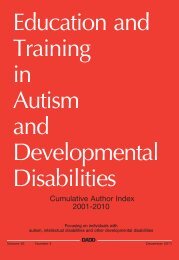etadd_47(3) - Division on Autism and Developmental Disabilities
etadd_47(3) - Division on Autism and Developmental Disabilities
etadd_47(3) - Division on Autism and Developmental Disabilities
You also want an ePaper? Increase the reach of your titles
YUMPU automatically turns print PDFs into web optimized ePapers that Google loves.
Educati<strong>on</strong> <strong>and</strong> Training in <strong>Autism</strong> <strong>and</strong> <strong>Developmental</strong> <strong>Disabilities</strong>, 2012, <str<strong>on</strong>g>47</str<strong>on</strong>g>(3), 255–268<br />
© <str<strong>on</strong>g>Divisi<strong>on</strong></str<strong>on</strong>g> <strong>on</strong> <strong>Autism</strong> <strong>and</strong> <strong>Developmental</strong> <strong>Disabilities</strong><br />
Preparing Children with <strong>Developmental</strong> <strong>Disabilities</strong> for Life<br />
in the Community: A Tanzanian Perspective<br />
Angi St<strong>on</strong>e-MacD<strong>on</strong>ald<br />
University of Massachusetts Bost<strong>on</strong><br />
Abstract: Special educati<strong>on</strong> is relatively new in Tanzania. The Irente Rainbow School (IRS) in Lushoto,<br />
Tanzania, where this ethnographic case study was c<strong>on</strong>ducted, is the first school for children with developmental<br />
disabilities in the area. Their curriculum stresses skills important in family life <strong>and</strong> the rural ec<strong>on</strong>omy of<br />
Lushoto. The purpose of the study was to explore how local c<strong>on</strong>text <strong>and</strong> beliefs about disability influenced how<br />
participants understood their roles at the school <strong>and</strong> how they implemented curriculum. The ethnographic case<br />
study employed qualitative research techniques to ensure credibility <strong>and</strong> triangulati<strong>on</strong> of data <strong>and</strong> research was<br />
c<strong>on</strong>ducted over a ten-m<strong>on</strong>th period.<br />
The Rainbow staff created a natural setting to teach <strong>and</strong> practice daily living <strong>and</strong> vocati<strong>on</strong>al skills to prepare<br />
students for home <strong>and</strong> work. The curriculum was based <strong>on</strong> the local community funds of knowledge, <strong>and</strong> the<br />
pedagogy <strong>on</strong> practices that were supported by the local culture. As special educati<strong>on</strong> evolves, programs will<br />
change to meet the needs of local populati<strong>on</strong>s. Knowledge of local c<strong>on</strong>text is critical to give children with<br />
disabilities the best opportunity for an educati<strong>on</strong> <strong>and</strong> meaningful participati<strong>on</strong> in their community.<br />
Students with disabilities around the world<br />
learn first from their families <strong>and</strong> their envir<strong>on</strong>ments.<br />
Curriculum should be both culturally<br />
<strong>and</strong> socially relevant, providing individuals<br />
with the knowledge relevant to their local<br />
community <strong>and</strong> skills that they will be able to<br />
use after completing school. Evidence-based<br />
practice is a w<strong>on</strong>derful starting point for curriculum<br />
development, but in unique locati<strong>on</strong>s,<br />
like rural Tanzania, it is also essential to<br />
focus <strong>on</strong> the needs of the local community.<br />
Since the 1980s, the focus <strong>on</strong> educati<strong>on</strong> for<br />
people with disabilities intensified through<br />
the work of the United Nati<strong>on</strong>s. At the same<br />
time, a shift toward inclusive educati<strong>on</strong> for<br />
students with disabilities worldwide occurred<br />
in 1994 after the acceptance of the Salamanca<br />
Statement <strong>on</strong> Principles, Policy, <strong>and</strong> Practices<br />
in Special Educati<strong>on</strong> by ninety-two governments<br />
<strong>and</strong> twenty-five internati<strong>on</strong>al organizati<strong>on</strong>s.<br />
Given that all children have a right to a<br />
This research was supported in part by a grant<br />
from Fulbright IIE. Corresp<strong>on</strong>dence c<strong>on</strong>cerning<br />
this article should be addressed to Angi St<strong>on</strong>e-Mac-<br />
D<strong>on</strong>ald, Department of Curriculum <strong>and</strong> Instructi<strong>on</strong>,<br />
University of Massachusetts Bost<strong>on</strong>, 100 Morrissey<br />
Blvd., Bost<strong>on</strong>, MA 02125.<br />
quality educati<strong>on</strong>, the issue of effective educati<strong>on</strong>al<br />
practice becomes important.<br />
In the United States <strong>and</strong> the United Kingdom,<br />
the use of evidence-based practices to<br />
improve the quality of educati<strong>on</strong> <strong>and</strong> to<br />
strengthen practices that are proven to increase<br />
learning for students has guided the<br />
development of curriculum (Brusling, 2005).<br />
Davies (1999) characterized evidence-based<br />
practices as practices supported by a research<br />
base. Evidence-based educati<strong>on</strong> describes systematic<br />
guidelines for research to establish<br />
evidence-based practices (Hargreaves, 1996).<br />
The Nati<strong>on</strong>al Center for Special Educati<strong>on</strong><br />
Research (NCSER) in the United States, as<br />
part of the Institute for Educati<strong>on</strong> Sciences<br />
(IES), funds research to establish evidencebased<br />
practices that have been validated as<br />
effective for students with disabilities (“The<br />
Nati<strong>on</strong>al Center for Special Educati<strong>on</strong> Research<br />
(NCSER) Home Page,” 2008). The<br />
What Works Clearinghouse program <strong>and</strong> website<br />
were developed by IES to disseminate<br />
studies in educati<strong>on</strong> <strong>and</strong> catalog evidencebased<br />
practices. Universities educate future<br />
teachers about evidence-based practices for<br />
students with developmental disabilities <strong>and</strong><br />
school districts expect teachers to teach the<br />
Life in the Community: A Tanzanian Perspective / 255

















